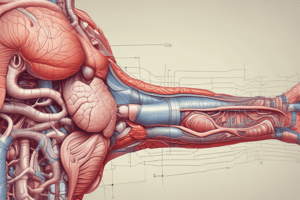Podcast
Questions and Answers
Which organ plays a crucial role in breaking down fats and preparing them for absorption in the small intestine?
Which organ plays a crucial role in breaking down fats and preparing them for absorption in the small intestine?
- Liver (correct)
- Gallbladder
- Esophagus
- Large Intestine
What is the approximate total weight of food consumed by a person over a lifetime based on the information provided?
What is the approximate total weight of food consumed by a person over a lifetime based on the information provided?
- 365 kilograms
- 28.8 kilograms (correct)
- 1 to 2.7 kilograms
- Over 40,000 kilograms
Where does the digestion process begin according to the information provided?
Where does the digestion process begin according to the information provided?
- Liver
- Mouth (correct)
- Small Intestine
- Stomach
Which of the following is NOT part of the human digestive system?
Which of the following is NOT part of the human digestive system?
What is the function of saliva in the digestive system?
What is the function of saliva in the digestive system?
Which organ absorbs remaining fluids and forms waste products into feces?
Which organ absorbs remaining fluids and forms waste products into feces?
How many specialized cell types are mentioned as part of the human digestive system?
How many specialized cell types are mentioned as part of the human digestive system?
What is the last step in the journey of food through the digestive system before elimination?
What is the last step in the journey of food through the digestive system before elimination?
Flashcards are hidden until you start studying
Study Notes
- People on average consume between 1 and 2.7 kilograms of food per day, totaling over 365 kilograms per year and over 28,800 kilograms over a lifetime.
- The human digestive system is complex, with ten organs covering nine meters and over 20 specialized cell types working together to convert food into nutrients and energy.
- The digestive system consists of four main components: the digestive tract, pancreas, gallbladder, liver, enzymes, hormones, nerves, and blood, all working harmoniously to digest food and deliver final products.
- The digestion process begins in the mouth, where saliva is produced to moisten and break down starch in the food before it reaches the esophagus.
- The stomach, pancreas, liver, and gallbladder play crucial roles in further breaking down and analyzing food components, especially fats, to prepare them for absorption in the small intestine.
- The small intestine is where final digestion occurs, breaking down fats into fatty acids and glycerol, proteins into amino acids, and carbohydrates into glucose for absorption into the bloodstream.
- The large intestine, or colon, absorbs remaining fluids and forms waste products into feces before elimination through the rectum, completing the approximately 30 to 40-hour journey of food through the digestive system.
Studying That Suits You
Use AI to generate personalized quizzes and flashcards to suit your learning preferences.




